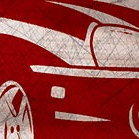Hand Washing vs. Automatic Washing

Driveway car washing is widely considered a wholesome ritual for those who care about their cars. Yet it's one of the worst things you can do to your car's finish. First, rags and sponges used in the process inevitably become impregnated with tiny grit particles that scratch the paint and clearcoat. And since garden hoses often fail to remove all soap film, soap residue can "bake" into the finish and eat into the paint for days afterward.
University Studies Confirm Hand Washing Harms Vehicle Finishes…
A landmark study by the Technological University of Munich (Germany), in association with Mercedes-Benz, showed automatic car washing to be far superior to driveway washing for preserving automotive finishes. Subsequent tests by the University of Texas Construction Research Center confirmed these findings.
In the Mercedes-Benz tests, 25 washings were conducted on identical new-model sedans having pristine factory paint jobs. Before each washing, the test vehicles were coated with a mix of street dirt, under-fender accumulation, oily water and thawing-salt residue. The grit particles in the mixture were heavy enough to damage the toughest painted surface.
The hand-washings were performed by average car owners, unaware of the test's purpose, who were asked to get the cars as clean as possible, using the washing supplies of their choice (garden hose, bucket, sponges, towels, detergents, etc.).
The "sandpaper" effect of hand washing
For the tests, scientists used electron microscopes able to record the density and depth of abrasions down to 0.27 of 1,000th of a millimeter. After 25 hand washings, microphotography revealed a dense, crisscross pattern of scratches on the vehicle finish, penetrating as far as 10% into the paint thickness. Under high magnification, these scratches formed "sandpaper" patterns attributable to the action of tiny dirt particles trapped in the pores of the rags and sponges used.
A failure to perform under pressure
The tests also showed that typical household garden hoses were unable to generate sufficient water volume and hydraulic pressure to remove all detergent residue from the finish of the car.
A positive reflection on the automatic wash
The machine washes, also, were done under real-world conditions, unannounced beforehand, at a modern commercial car wash. After 25 trips through the automatic wash, microphotos of the vehicle's surface showed no sign of the tangle of deep scratches created by handwashing. In the Texas University tests, especially, machine wash "reflectiveness readings" (i.e., retention of the factory paint's original luster) were 300-700% higher than with hand washing.